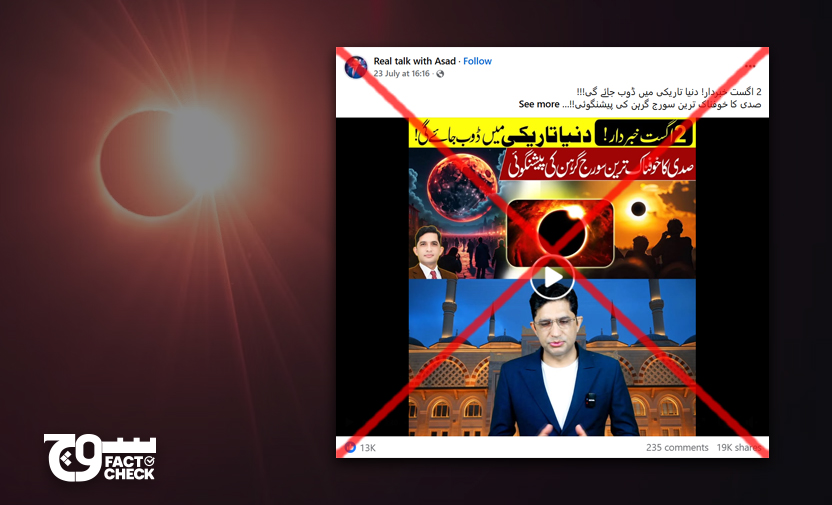
Claim: A unique solar eclipse on 2 August 2025 will last over six minutes and plunge the entire world into darkness. The phenomenon is seen once every 100 years.
Fact: No such solar eclipse occurred on 2 August 2025. A solar eclipse will indeed occur on 2 August 2027, but it will not plunge the whole world into darkness nor will the next one occur after a 100 years.
On 24 July 2025, Dr Asad Mehmood — a “homeopathic doctor [and] certified motivational speaker”, according to the intro on his Facebook page ‘Real talk with Asad’ — posted (archive) a video, talking about a “terrifying solar eclipse”.
In the video, which is close to four minutes long, Dr Mehmood says the solar eclipse “will plunge the entire world into darkness on 2 August 2025”. This is only seen once in a century, he adds.
“On that day, complete darkness would fall on a large portion of the world for almost six minutes. There would be no daylight, no sunlight, just silence, darkness, and an unusual peace,” he says in the clip, which is shared (archive) on his personal Facebook profile as well.
The accompanying Urdu caption reads as follows:
“2 اگست خبردار! دنیا تاریکی میں ڈوب جائے گی!!! صدی کا خوفناک ترین سورج گرہن کی پیشنگوئی!!
[2 August warning! The world will plunge into darkness!!! The most terrifying solar eclipse of the century is predicted!!]”

Dr Mehmood also claims that on the same day as this “astronomical manifestation,” 2 August 2025, the Earth would be the farthest from the sun — a concept known as aphelion. He also asserts that perigee would also occur; this is when the moon would be the closest to the Earth. These two “factors” when occurring at the same time lead to a solar eclipse, he states.
In the latter part of the video, the “motivational speaker” talks about Islam and the purpose of life, while suggesting that such events mean people need to be ready for the end of the times.
Fact or Fiction?
Soch Fact Check searched for whether any authentic sources — such as a scientific body or group — had announced a solar eclipse on 2 August 2025 but did not find one.
This year comprises two solar and lunar eclipses each, according to EclipseWise.com. A partial solar eclipse — the first one of 2025 — has already occurred on 29 March 2025 and the second one, also partial, is expected to take place on 21 September 2025.
The September 2025 partial solar eclipse is also confirmed by Encyclopaedia Britannica and the National Aeronautics and Space Administration (NASA), both of which add that a total solar eclipse will also occur on 12 August 2026.
The last unusually long eclipse occurred on 8 April 2024, lasting “about 4 minutes and 28 seconds”.
On the other hand, however, a very likely explanation for the claim in question is that a real, record-breaking solar eclipse is expected on 2 August 2027 — two years after 2025 — according to prediction data by the late NASA astrophysicist Fred Espenak, available on the website of the Agency’s Goddard Space Flight Center (GSFC).
Its path of totality, which means areas that will be the darkest, “will be about 160 miles (258 kilometers) wide and surge across 9,462 miles (15,227 km) of Earth’s surface”, says Space.com.
The 2 August 2027 event has been dubbed “Great North African Eclipse” and will last six minutes and 22 seconds in Egypt’s Luxor, which will experience totality. Additionally, southern Spain, North Africa, and the Middle East are also on its path but the duration differs, mostly lasting in these areas for a lesser time. According to EclipseWise.com, a “partial eclipse will be seen from much of Europe, Africa, and South Asia”.
The 2 August 2027 will also be “longest remaining totality until 16 July 2114”, notes Space.com, which adds that there are no solar eclipses of any type predicted in August 2025. It will be visible in 12 countries, including Algeria, British Indian Ocean Territory, Egypt, Gibraltar, Libya, Morocco, Saudi Arabia, Somalia, Spain, Sudan, Tunisia, and Yemen, according to Time and Date.
The last such total solar eclipse occurred on 11 July 1991, lasting six minutes and 53 seconds.
We also came across an article in the BBC Sky at Night magazine, which says, “There’s been a lot of talk about an upcoming total solar eclipse in August 2025, but this is unfortunately an example of online hype, and the solar eclipse in question will occur in 2027.”
Therefore, the claim that the entire world will go dark is false as is the assertion that the total solar eclipse occurs once every 100 years, since the next predicted year is 2114, which is 87 years from 2027.
Secondly, aphelion for this year has already occurred on 4 July 2025, according to multiple news outlets, as well as Time and Date.
As for perigee, it takes place at least once in the moon’s monthly orbit and, in this month, will occur on 14 August 2025, according to Time and Date and Fourmilab, a website by the late American computer programmer John Walker.
Fourmilab also states that since the moon is moving farther away from the Earth slowly over time, there will come a point in the future when it would not be big enough to sufficiently cover the sun. However, “at some point before that date, when the moon is near perigee and the Earth near aphelion, final totality will occur — the last total eclipse of the sun visible from Earth”.
Therefore, since the perigee and the aphelion were at different dates in 2025, a “final totality” is impossible this year. This also means that aphelion and perigee did not combine to cause a “terrifying solar eclipse”, as stated Dr Mehmood.
Virality
Dr Mehmood’s video, which contains the primary claim, has been viewed over 5 million times so far.
Soch Fact Check also found the claim shared here, here, here, here, here, and here.
The claim was posted here, here, here, and here on Instagram, here on Threads, and here, here, and here on TikTok. It was also shared here on X (formerly Twitter) and here, here, here, and here on YouTube.
BOL News ran videos with false headlines — “Solar Eclipse At 2nd August” — and false text in their thumbnails. GNN used the same clickbait method in their report.

First and second screenshots depict thumbnails of clickbait YouTube videos by BOL News; third one shows thumbnail of clickbait YouTube videos by GNN.
We also observed that multiple Indian media outlets published reports with false and misleading headlines; these include Oneindia, Indian Defence Review (IDR), The Times of India, CNBC TV18, The Economic Times, and The Economic Times.
Conclusion: No such solar eclipse occurred on 2 August 2025. A solar eclipse will indeed occur on 2 August 2027, but it will not plunge the whole world into darkness nor will the next one occur after a 100 years.
Background image in cover photo: Andrew Preble
To appeal against our fact-check, please send an email to appeals@sochfactcheck.com
